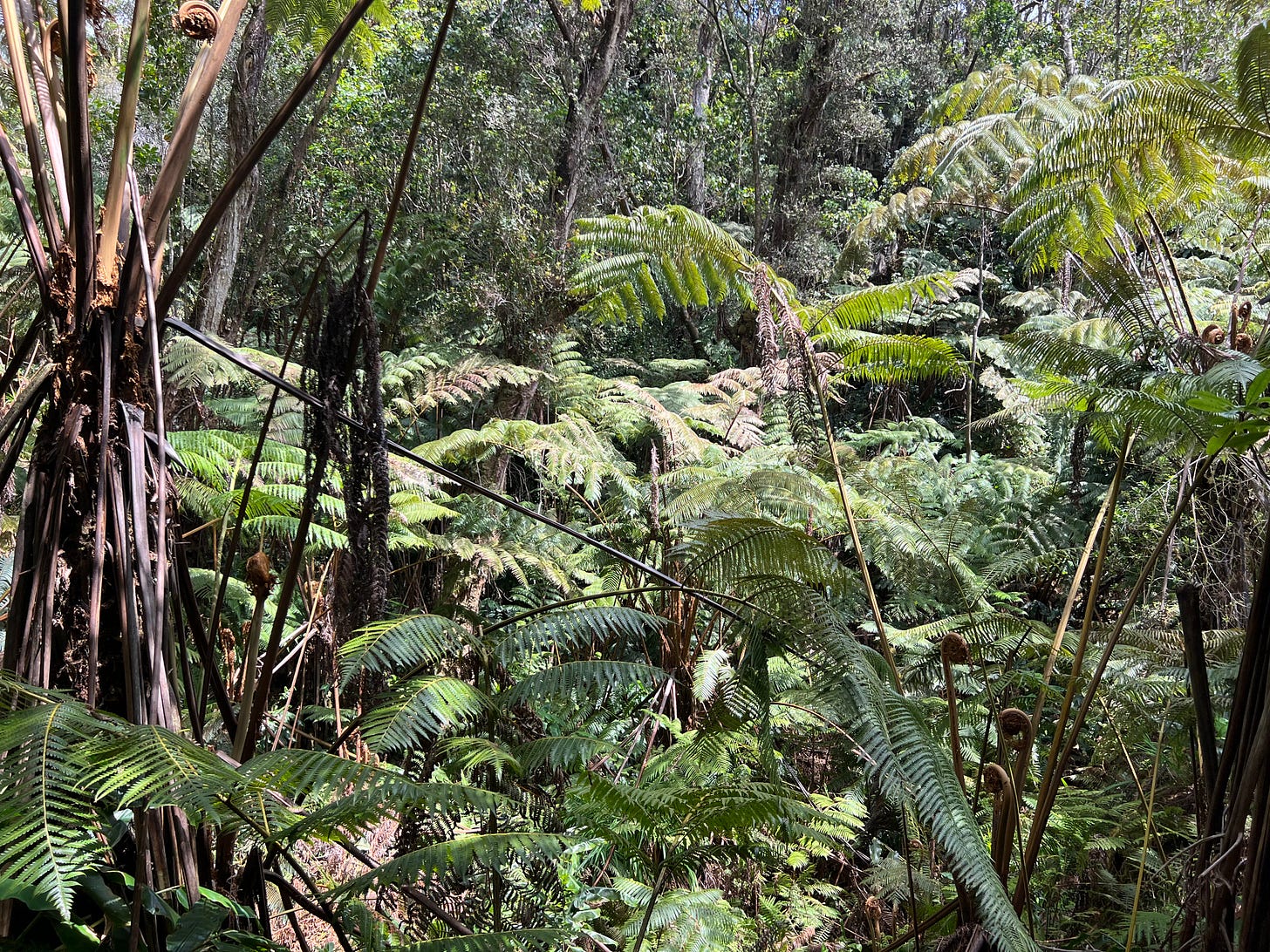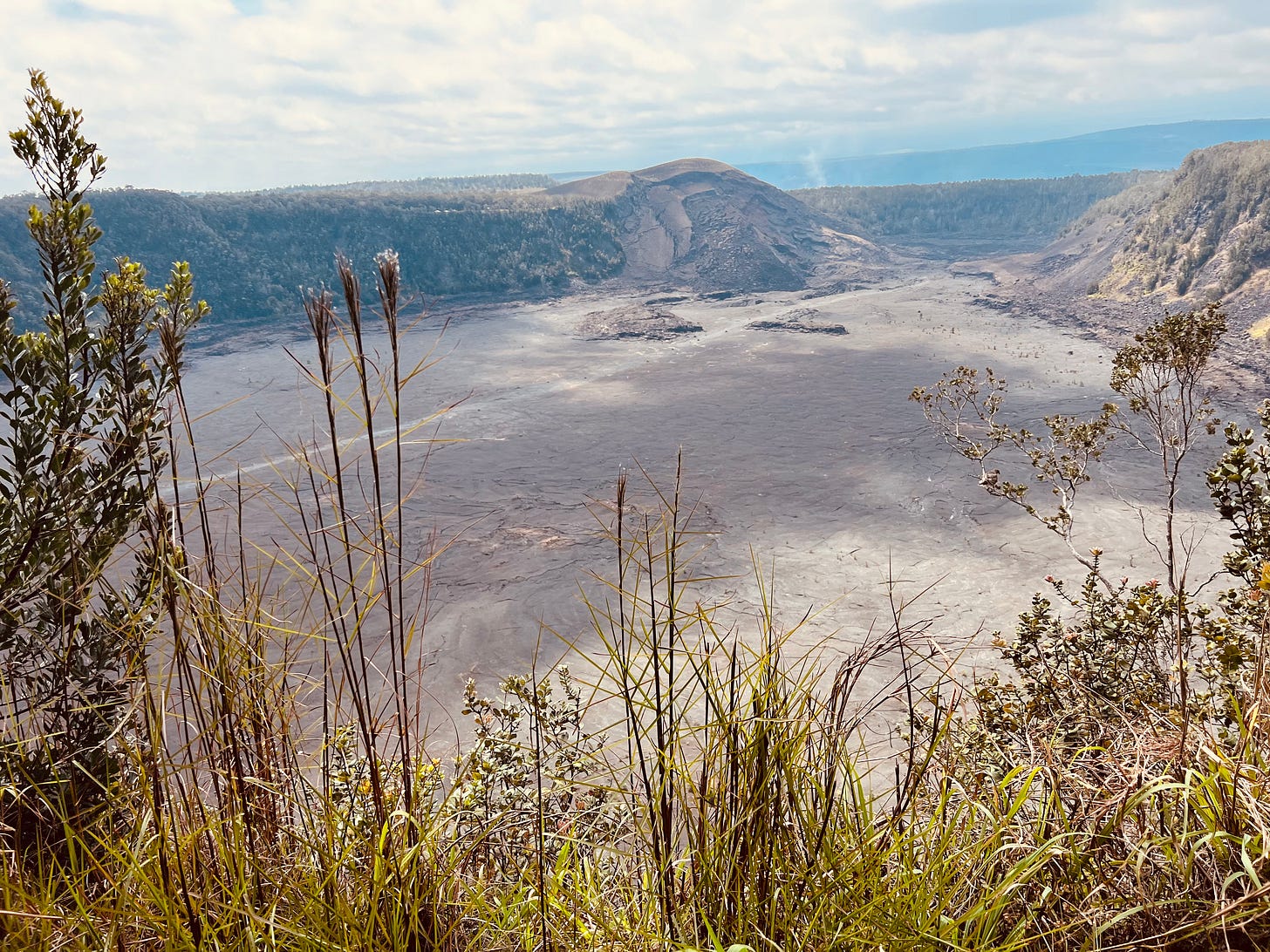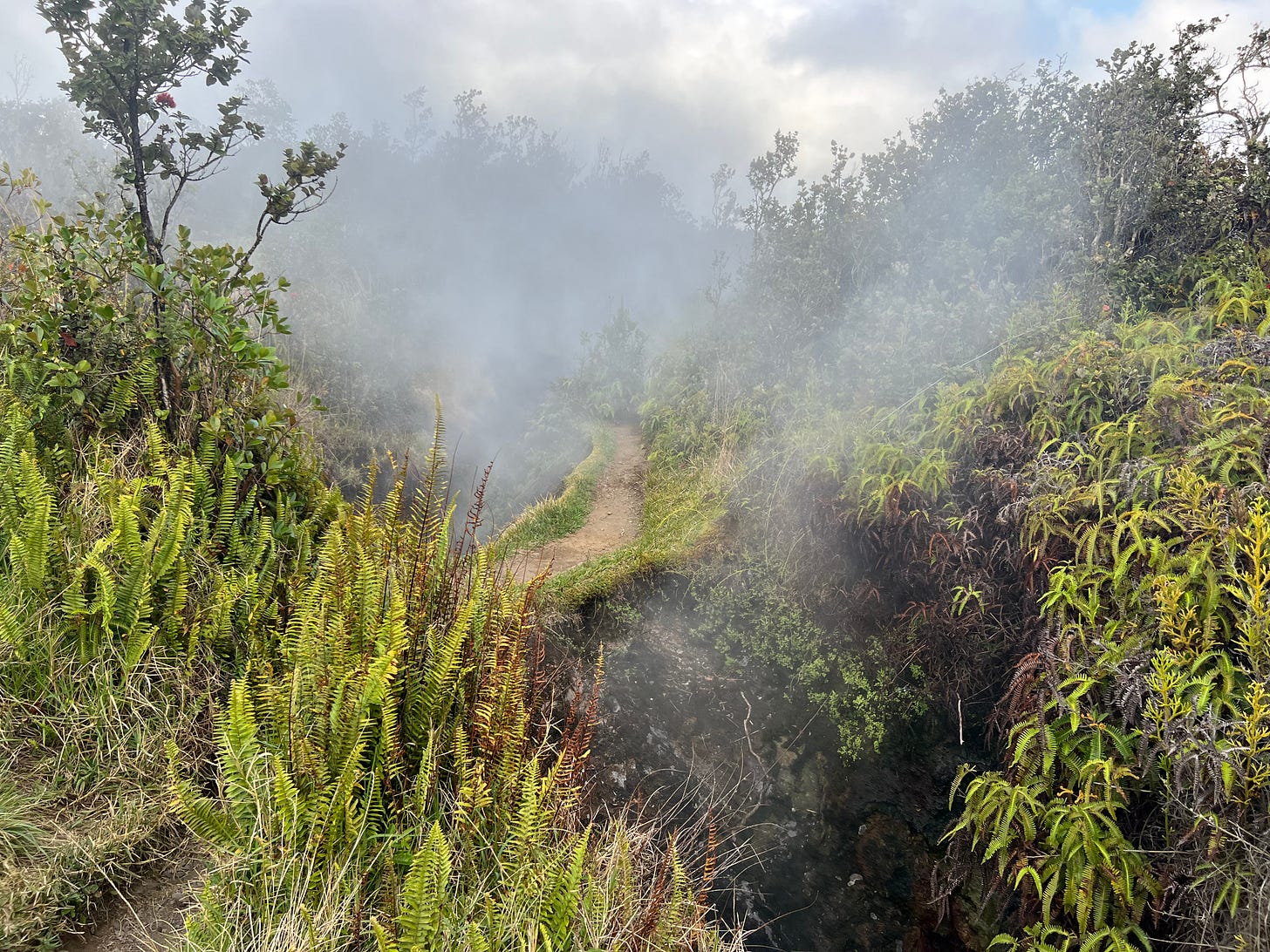1.
Born in the village of Volcano, amidst the misty lava fields and giant tree-ferns of the Big Island, Garrett Hongo left this land before he was old enough to really remember it. After spending a few years on Oahu, his family eventually settled in Los Angeles. And yet, Hongo continued to long for this place—the land of his birth that was just beyond the reaches of his memory.
Whenever he would ask about his past, family members would clam up and change the subject— and so his longing grew. As he himself grew, becoming, as he did a much loved, great American poet. Like many people, his identity is a work in progress. A story of home. And he brings this to Volcano, which is one of the best memoirs I have ever read. If I had to compare it to something, I would say it reminded me most of Sebold’s Rings of Saturn in the way the story meanders in its interrogation of inherited memory— his is an immigrant story of the Japanese who came to the islands to work on the sugar plantations and open local shops. Hongo, in the rich and musical language of a poet, is telling the story of the ghosts of his ancestors’ past. But he is also bringing to life the flowers, birds, and trees of America’s great tropical rain forest.
2.
I think it is true that you can long for certain places in the same way you can long for certain people. Like Hongo, I spent my formative years in Los Angeles. Yet, I never felt at home in LA—even today I am maladjusted to it. Japan, where I spent over two decades, was the home I had been searching for. After my first decade there, I would often think to myself, channeling my inner Mughal emperor, that “if there is a paradise on earth, then this is it, this is it.” I loved Japan and felt myself embedded in the landscape and at home with the people. It was there in Japan where I discovered my career as a translator and student of the tea ceremony—it was also where I was married and gave birth to my beloved son.
I wonder when the many layers that make up a person’s identity are peeled away, at the core is not the place we call home.
What is home? Certainly it’s not necessarily the town where we were born or where our parents came from. Like Hongo, as a child, I spent time in Honolulu, where my beloved Auntie and my cousins lived. Before traveling to Japan, Hawaii is where I thought I would land. And so, though I do not share Hongo’s heritage exactly, so much of his experience resonates deeply with me. Not a week goes by that I am not checking the real estate listing in Waimea and Honolulu…
Hongo, like me, worries that he doesn’t have a right to this heritage to the volcano since he left when he was so young, only revisiting much later in life—and yet, is his search for self not the way of the artist?
In Hongo’s words:
And yet this was all so silly. How can one derive a sense of self from something as lately invited into one’s life as Volcano was for me? I was born there, but left it after only eight months. It was a mystery to me, and one for which I had no special curiosity until I was past thirty. Though my anxiety demanded that identity have its source in the unchanging—a place and attendant culture somehow “fixed” in the scheme of things, a thing easily characterized and identifiable—my thoughts ran otherwise, saying I belonged nowhere, that a shopping mall in Missouri or a trout stream in Oregon or a Hilo movie theater could explain me as well as the lava eddying out of the lake at the vent of Kūpaianaha. My father, after all, was buried in a cemetery in San Pedro, overlooking Los Angeles Harbor in California.
Likewise, my son spent his first seven years in Japan, where as a family we spoke exclusively in Japanese. Living in a small town going to public school, Japan was the land of his birth. Then at seven, we moved to California, where he began life in the small town where I was raised. He switched totally to English and promptly forgot all of his Japanese.
And yet, he likes to call himself “Asian,” though he hardly remembers his life back in Japan. But I always hoped he would be “allowed” to self-identify in a way that was comfortable for him. Maybe it took moving to Hawaii, where people are such a beautiful blend of cultures and ethnicities, for him to finally feel the question, “what are you?” was a positive thing to be asked.
He is, at last, taking a Japanese class at university. He says it is “insanely hard.”
Yep.
3.
One of my favorite novelists Yasushi Inoue famously refused to visit the real-life places he was writing about in his silk road novels, saying, he wanted to keep the images he held in his heart pristine. I think in Hongo’s case the stories he heard about the Big Island, a place he didn’t remember so well before returning as an adult, were more real to him than his school days in Los Angeles. Last week I wrote a story about ghosts. Ghosts are unfinished business, as Salman Rushdie once said. Stories are ghosts and so is our heritage. Hongo is looking for the ghost of his grandfather in everything. In Volcano, he reads poetry from the Tang dynasty and looks out over the trees hearing the i’iwi, calling across the forest.
In a workshop, I once was given the prompt of writing about your favorite place which you’ve never been. Pico Iyer wrote an essay with that title about a town in Iran which he of course did go and visit maybe after writing the essay, I can’t recall.
I think if I was a book, I would be a polyphonic novel set in multiple locations —places where I have lived for long stretches of time or visited repeatedly, cities I have spent time in or fallen in love with at first sight. But I also think there would be at least one setting where I had never been in real life—only knowing it through reading. And that would be my favorite, where the writing really popped.
The last time I saw my beloved Auntie in Oahu, we drove from Hawaii Kai over to an open-air museum in Waipahu that has preserved what life was like on the sugar plantations. It was incredible seeing the small encampments where different groups self-segregated—Japanese over there, Filipinos here, Chinese there. After Caucasians (the haole) these are the other main groups on the islands (native Hawaiians are the fourth largest group after white, Filipino, and Japanese).
So many Japanese emigrated to Oahu and the Big Island to work the plantations or open shops like Hongo’s grandfather. The lady who gave us the tour of the plantation that day was of Filipino descent and after the tour was finished, I was amazed when she brought us over to her car and popping the trunk, showed us all these containers of food. She had prepared a Filipino feast! We ate in the shade of a gigantic tree.
Heritage lives on in Hawaii—though it sure can feel under pressure.
VOLCANO CAME to be a kind of faith to me after a while. We came and went so many times, but it became the place I wanted to come back to, to which I believed I could return. I needed it like an identity, a way to mark myself. “I was born in Volcano…” began the morning chant in my head, like “I am a Jew” or “My parents came from Ennis, county Clare,” to others. Like a pilgrim bowing toward Mecca, I wanted a prayer to be the anchor of my own presence to myself and in a renewable relation to something much greater. So, Volcano—its rain forest, villagers, and calderas—came to mean a preserve of identity and consciousness to me, a thing almost like a faith. I’d meet strangers and say, “I am from Volcano,” and feel my soul bow toward a memory of Mauna Loa rising above a skirt of clouds, bruised at the base with rain.
That is what I want: to dwell in a place where I feel truly embedded.
—Written in Taos, with limited access to the Internet
“Garrett Hongo: I Hear America Singing” (JSTOR)
Two new volcano novels for the summer:
Lies and Weddings by Kevin Kwan set partly and wonderfully on the Big Island
Michael Crichton and James Patterson's novel Eruption (I agree with this review that you can skip it.)








It’s so interesting yet strange to realize your true home is not where you expected it to be. I always imagined I’d live in New England, where I grew up but Japan grabbed hold of me! By the way, I read Disorientation. It was darker than I expected but definitely glad to have read it!
I love the way your mind works!
Especially love: I think if I was a book, I would be a polyphonic novel set in multiple locations —places where I have lived for long stretches of time or visited repeatedly, cities I have spent time in or fallen in love with at first sight. But I also think there would be at least one setting where I had never been in real life—only knowing it through reading. And that would be my favorite, where the writing really popped.